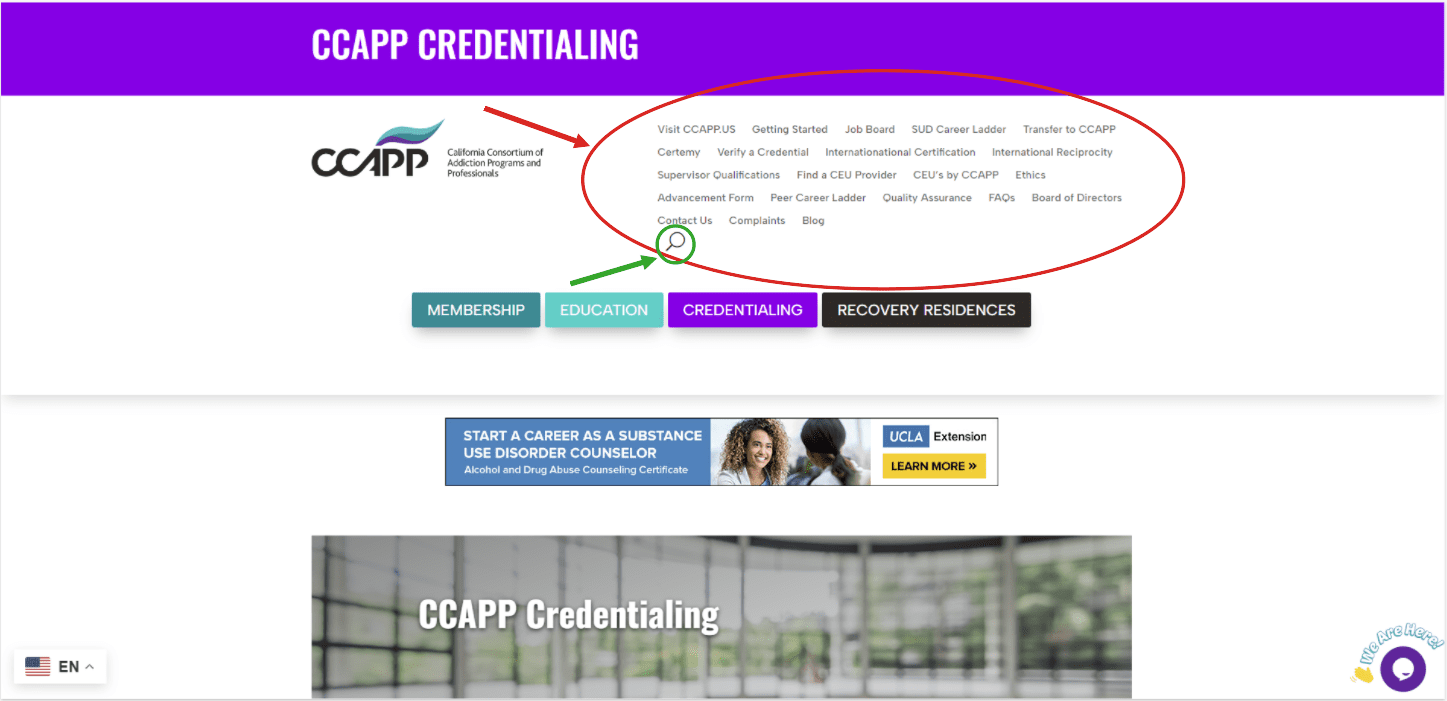In substance use disorder (SUD) counseling, achieving and maintaining professional credentials is crucial for delivering high-quality care. The California Consortium of Addiction Programs and Professionals (CCAPP) plays a pivotal role in this process through its dedicated website, CCAPP Credentialing. This platform serves as a comprehensive resource for aspiring and current addiction-focused professionals, providing clear pathways to certification and licensure. From foundational credentials like CADC-I to advanced certifications such as CADC-II and CADCIII, the site ensures that practitioners meet rigorous standards in education, training, and experience. Whether just beginning the journey in the SUD counseling field or looking to advance a career, navigating the CCAPP Credentialing website is an essential step toward professional growth and excellence (CCAPP Credentialing website, 2024).
Navigating the website is essential for prospective addiction-focused professionals. Upon opening the CCAPP Credentialing website, users will see four rows of labeled boxes. Clicking on a box opens a new tab with specific information. Once finished with a section, simply close the tab to return to the main website. The first box is labeled "Getting Started," which provides guidance on the steps and requirements to become a SUD professional, including career advancement opportunities. For more information, click here (CCAPP Credentialing website, 2024).


Below the navigation menu and magnifying glass icon, there are colorful boxes labeled with different CCAPP sections: Membership, Education, Credentialing, and Recovery Residences. Clicking on one of these boxes opens a new tab with the corresponding CCAPP website.
The "Verify a Credential" box directs users to "The CCAPP Registry," where clients, employers, and regulators can verify the credentials of alcohol and other drug (AOD) counselors. The term “pending” indicates a status not fully active due to administrative review, nonpayment of renewal dues, or declined payment. For more information, click here. To access The CCAPP Registry, click here (CCAPP Credentialing website, 2024).
For common questions about certification, Certemy, and the 9-hour orientation course, click on the square labeled “Frequently Answered Questions.” To access this link, click here (CCAPP Credentialing website, 2024).
For details on registering as a Registered Alcohol and Drug Technician (RADT), click on the "Get Registered" link, which provides steps for gaining practical experience and recognition. Click here for more information (CCAPP Credentialing website, 2024).
To explore certification options and their requirements, click on the “Get Certified” square. On this page, is a review of the renewal requirements to maintain certification and a place to see the career ladder, detailing the requirements for each credential and how to advance in the substance use disorder counseling field. On the right side of the page, there is also information on specialty credentials and recovery-related credentials. If interested in obtaining one of these credentials, click on the specific credential in the list to view its requirements and benefits. To access the site, click here (CCAPP Credentialing website, 2024).
For renewal requirements and procedures for late renewals, click on the "Renew a Credential” square. To access the site, click here (CCAPP Credentialing website, 2024).
To see the Substance Use Career ladder, click on the corresponding square, which also includes information on specialty and recovery-related credentials. To view this site, click here (CCAPP Credentialing website, 2024).
For those interested in mental health credentials, the "Mental Health Career Path" section details the requirements and options available, including endorsements and specialty credentials. Click here for more information (CCAPP Credentialing website, 2024).
To view the strict ethical guidelines that addiction professionals registered with CCAPP must follow in addiction counseling and treatment practices, click on the square labeled 'Ethics.' This section also provides information on the process for filing complaints regarding ethical violations. To visit this site, click here (CCAPP Credentialing website, 2024).
Becoming a substance use disorder professional requires meeting the educational requirements necessary for credentialing and certification. To view information about these educational requirements for certification, click the square labeled “Education for Certification.” This section explains how to find CCAPP-approved schools, outlines the necessary coursework and practicum experiences, and provides guidance for institutions on becoming approved providers. It also details academic content areas, supervised practicum requirements, and the process for verifying if a school's curriculum meets CCAPP standards. To access this section, click here (CCAPP Credentialing website, 2024).
For information on the outlined fees for initial applications, portfolio assessments, exams, renewals, late payments, and credential advancements for addiction professionals, click on the square labeled “Fee Schedule.” Details on the differences in fees for members and non-members, including information on specialty credentials and discounts for students and older professionals can be viewed by clicking here (CCAPP Credentialing website, 2024).
To learn about the members of the CCAPP Credentialing board, the organization’s mission, and its responsibilities, click on the square labeled "Credentialing Board." This section provides information about the board members' roles and the governance structure, highlighting the nonprofit's commitment to maintaining high standards in credentialing addiction-focused professionals and ensuring non-discriminatory practices in all its operations. To access this section, click here (CCAPP Credentialing website, 2024).
Scroll to the bottom of the page, labeled 'Recent Blog Posts,' where you can find several articles on various topics, such as becoming a certified alcohol and drug counselor in California and advancing further in certification with CCAPP. (CCAPP Credentialing website, 2024).
To chat live with an agent, go to the CCAPP Credentialing website. At the bottom right corner, is a handwave logo and the message 'We Are Here!' with an icon. Click the icon to open a form where you can chat with the next available agent.


Additionally, if needed, you can translate the page. Click on the American flag icon at the bottom left corner, then select your preferred language from the list.
Navigating the path to becoming a certified addiction-focused professional can be daunting, but the CCAPP Credentialing website simplifies this journey with its comprehensive resources and clear guidance. Whether you're starting with basic registration or aiming for advanced certifications, the site provides invaluable support at every step. From detailed explanations of educational requirements to practical information on ethical standards and renewal processes, CCAPP Credentialing equips you with the knowledge and tools to excel in the field of substance use disorder counseling. By exploring the various sections and resources available, you can confidently pursue your career goals and contribute to the vital work of supporting individuals on their journey to recovery. So, take the first step today and unlock your potential with CCAPP Credentialing as your guide.
.

